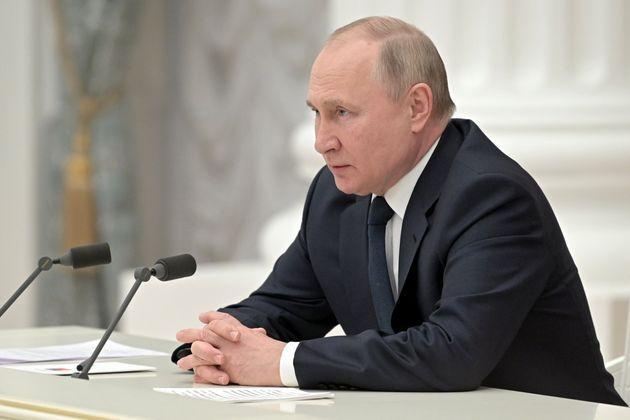Peace in Ukraine depends on the international community achieving something it has been unable to do for years: changing Russian President Vladimir Putin’s mind.
After centralizing power over two decades at Russia’s helm, Putin now singlehandedly makes the key decisions about his country’s national security policy. Ukraine and Western governments are working on three tracks to make him stop his invasion: They are trying to persuade Putin directly, while simultaneously pressuring Russians who might influence him with unprecedented global financial sanctions that Western nations say will continue until the Ukraine offensive ends. And they are stiffening Ukraine’s resistance to the onslaught to show that an easy, cheap military win is not an option for Putin.
But one week into the war, Western officials are extremely pessimistic about the chances of the Russian leader choosing to stop fighting and pursue a diplomatic settlement, saying they know little about Putin’s plans and are alarmed by the indications that they do have.
“Right now, I frankly do not see how anybody can get through to Putin,” said Vaira Vike-Freiberga, a former president of Latvia who met with her Russian counterpart repeatedly. “He is so dead set on rewriting history … he has invented a parallel universe in which he lives mentally.”
As Russian forces advance toward the Ukrainian capital of Kyiv, “the man is about to commit mass genocide,” she continued. “What is anybody going to tell him that hasn’t been told already by President [Joe] Biden, [British] Prime Minister [Boris] Johnson, [German] Chancellor [Olaf] Scholz? … This man is beyond being reached by words and certainly way beyond logic.”
French President Emmanuel Macron is the most prominent Western leader to maintain a dialogue with Putin. In a Thursday call, the Russian leader told his French counterpart that he will continue his assault and may even demand more concessions from the Ukrainians.
“There was nothing that Putin said that reassured us,” a top French official later toldThe Economist.
Though Ukraine opened talks with Russia on Monday and its president requested direct negotiations with Putin on Thursday, most foreign policy experts believe the key to a cease-fire is an agreement between Moscow and the major players it views as comparable world powers, like the U.S. or the European Union.
Biden last spoke with Putin on Feb. 12 and believes it is inappropriate to hold another call while Putin’s invasion is ongoing, White House press secretary Jen Psaki said this week. Speaking to NBC News for a story published on Thursday, a U.S. official said, “there are no signs Putin is willing to” deescalate at this point.
Western officials and analysts say they know what a possible deal would have to achieve: Primarily, it would need to address Putin’s desire for a greater Russian say over security conditions in his neighborhood while committing him to principles respected by most countries like the right to national sovereignty.
Yet they do not know when to expect him to take the first step towards that settlement — and they worry that if such negotiations do come, Putin may simply lay the groundwork for more conflict in the future.
A New Calculus For Putin
Putin watchers are struggling to make sense of the Russian leader’s current calculus.
The intelligence community lacks human sources close to him, perThe Washington Post, particularly because some Russians who were able to provide such information in recent years have left the country.
Some observers, however, see reason to be nervous about his state of mind.
“Putin is not doing well. He’s shouting at staff. His war is behind schedule. This is a dangerous time,” a European official told the Post.
Fiona Hill, a Putin biographer who worked on Russia issues at the White House, recently told Politico she sees a new level of “visceral emotion” in the Russian president’s public remarks, which worries her because he faces few checks and balances within the Kremlin. In handling Putin now, officials must prepare for him to use anything in his arsenal — including nuclear weapons — and have a plan to respond, Hill said. On Thursday, Russian foreign minister Sergey Lavrov hinted that Russia might unleash chemical weapons and blame the terrifying escalation on the U.S. and Ukraine.
Three possible factors could now push Putin toward the negotiating table.
The first depends on timing: how fast Western military support, from anti-tank missiles to air defense systems and ammunition, gets to the Ukrainians. Such aid is largely coming by land through Poland into western Ukraine, but it will then have to be transported to front lines further east.
“If that help has arrived in time to be of any effectiveness to slow down the encirclement of Kyiv and of Kharkiv” — the most important Ukrainian cities currently under attack — “then, since Putin has been spinning lies from morning to night, he will easily invent himself a reason why he might stop the aggression,” Vike-Frieberga said.


The U.S. and other Ukrainian partners could also inflict more economic pain on Russia with two tactics that would be especially alarming to Putin: sanctions on Russia’s crucial energy industry, which NBC reported the Biden administration is now considering, and specifically targeting Putin’s personal wealth.
While Western governments are sanctioning deep-pocketed Russians in the hope that they can turn Putin against the war, those figures have limited influence. “He makes it clear that he, the great leader, allows the oligarchs to become filthy rich but they must respect [his] wishes and desires,” Vike-Frieberga said. “I personally doubt that he would be influenced by their pain. His own personal pain is a different matter.”
Cutting A Deal With The Kremlin
The Biden administration and foreign friends like the French are repeatedly signaling that it’s not too late to negotiate. Putin could “deescalate,” Defense Secretary Lloyd Austin told NBC News in an interview aired Wednesday. Should the Russian leader decide to do so, world leaders and diplomats would face the fresh challenge of designing an effective deal.
Putin may be satisfied with ending the current crisis with a relatively modest win rather than capturing all of Ukraine like splintering the country into weak quasi-states, according to Hill, the former White House adviser. But some analysts fear that now that he has shattered the long taboo of waging a large-scale war in the heart of Europe, Putin is initiating a long, ambitious and likely bloody campaign to elevate his global status.
“He wants to go into history as a major figure for the greatness of Russia” who can reverse the toll of the collapse of the Soviet Union and the independence of countries such as Latvia, said Vike-Freiberga. After stepping down as the country’s president, Vike-Freiberga served as the head of a group of retired world leaders called the Club de Madrid. (She remains a member.)
“When I first met him … he told me what a sad thing it was that there was a border between our countries now” and people needed visas to travel between them, Vike-Freiberga said. “I told him [Latvians] were very happy to have passports where they could go to Paris and London instead of being taken in cattle cars to Siberia.”
Many international relations analysts say Putin’s agenda is about far more than Ukraine — including his often-stated concerns about the country possibly joining the NATO military alliance — and he ultimately seeks an era-defining settlement.
“Putin has said that only a few great powers — Russia, China, India and the United States — enjoy absolute sovereignty, free to choose which alliances they join or reject,” Georgetown University professor Angela Stent wrote in a January essay. “He is determined to reassert Russia’s right to limit the sovereign choices of its neighbors and its former [Soviet-era] allies and to force the West to accept these limits.”
Stent advised Western officials to design a new status quo in Europe that Putin would see as worth standing by.
Such a deal would be hard to craft. It would need to reassure European nations that Washington is not negotiating away their right to seek support like military equipment or troop deployments from the NATO military alliance — shows of solidarity that Europeans have counted on as Russia has intervened militarily and politically in their region. Meanwhile, it would need to address Russia’s concerns about key neighbors drawing closer to the West and its increasing global isolation.
And American and allied negotiators would have to contend with complex and time-honored Russian diplomatic tactics. In a 2021 paper for the Lawrence Livermore National Laboratory, former Pentagon and State Department official Michael Albertson assessed how to negotiate with Putin by examining the history of U.S.-Russian arms control talks.
Calling Putin “a dealmaker, but not necessarily a negotiator,” he wrote that Russian mediators often present a long list of grievances, distracting from the issue at hand, and he noted “a dramatic reduction” in U.S. officials’ familiarity with their Russian counterparts in recent years.
“From a Russian perspective, the best negotiating approach is to stick to a hard line at one end of the negotiating spectrum, wait for a centrist U.S. proposal, let time and political pressure build on the U.S. side, and wait for the U.S. position to gradually shift closer to the preferred Russian outcome,” Albertson wrote.
If Putin outmaneuvers his Western counterparts, the ultimate result could be even deadlier wars in the future.
Vike-Freiberga believes the limited international response to his past incursions into Ukraine and Georgia drove Putin to launch his current invasion.
“Appeasement has only whet his appetite,” she said.
This article originally appeared on HuffPost and has been updated.




